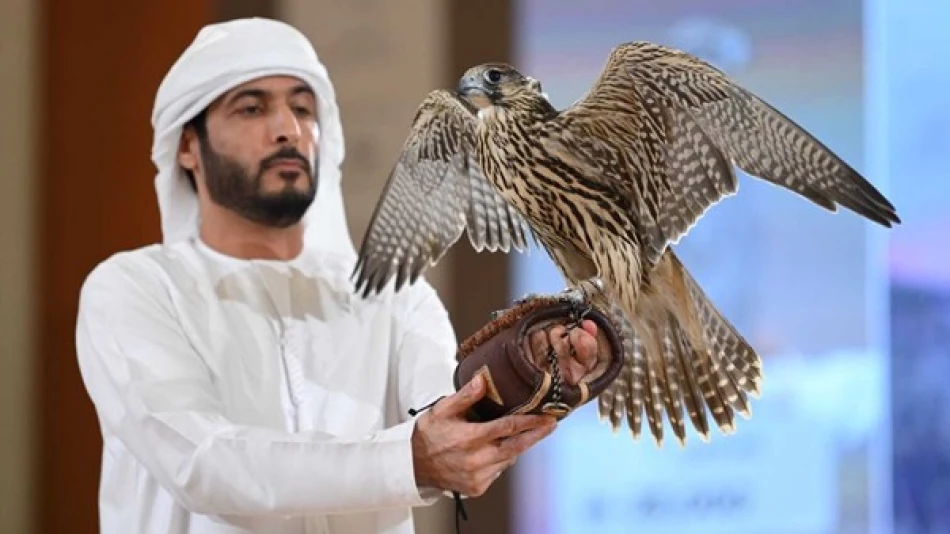
Abu Dhabi Hunting and Equestrian Exhibition Showcases Diverse Program on Day 8
Abu Dhabi's Falconry Auction Breaks Records as Traditional Hunting Culture Commands Premium Prices
The eighth day of Abu Dhabi's International Hunting and Equestrian Exhibition witnessed a striking demonstration of how deeply-rooted cultural traditions continue to thrive in modern markets. Seven falcons sold for a combined 251,000 UAE dirhams ($68,300), with a prized "Gyr Saker" commanding 130,000 dirhams alone—signaling robust international demand for these ancient symbols of Emirati heritage.
Falconry Market Reflects Cultural Investment Boom
The seventh falcon auction session, conducted both in-person and online, attracted elite falcon breeders from across the globe. The record-breaking sale of the Gyr Saker hybrid—nearly double the price of typical hunting falcons—demonstrates how traditional practices are evolving into sophisticated luxury markets.
This pricing trend mirrors similar cultural luxury markets worldwide, from Japanese koi auctions to European thoroughbred sales, where heritage breeds command exponential premiums. The hybrid auction format also reflects the UAE's broader digital transformation strategy, making traditional markets accessible to international collectors.
Final Auction Round Expected to Drive Higher Bids
With the exhibition's final auction scheduled for Sunday, industry observers anticipate increased competition as serious collectors make their closing moves. The crescendo effect—common in high-stakes auctions—typically drives final-day prices significantly higher than opening rounds.
Emirati Equestrian Heritage Takes Center Stage
The UAE Arabian Horse Society's third annual competition for Emirati horse trainers showcased another pillar of the nation's cultural identity. Participants, dressed in traditional Emirati attire, demonstrated their skills in the Arena for Events, competing on criteria including horse control, presentation elegance, and cultural authenticity.
This emphasis on preserving traditional training methods while maintaining competitive standards reflects the UAE's broader approach to cultural preservation—modernizing presentation while maintaining authentic practices. Similar initiatives in Qatar and Saudi Arabia show how Gulf states are investing heavily in cultural tourism and heritage preservation.
Adventure Tourism Sector Gains International Traction
The exhibition's hunting and safari tourism section featured premium experiences from South Africa, Botswana, and the UAE, highlighting the growing luxury adventure travel market. This sector has rebounded strongly post-pandemic, with high-net-worth individuals increasingly seeking exclusive, culturally-immersive experiences.
Weapons and Equipment Draw Global Brands
International arms manufacturer Caracal showcased UAE-designed firearms, demonstrating the country's growing defense manufacturing capabilities. The weapons and shooting equipment sector's strong visitor turnout reflects both recreational hunting interest and the UAE's position as a regional defense hub.
Cultural Diplomacy Through Traditional Arts
The inclusion of Japanese tea ceremony demonstrations and "Decoupage" workshops alongside traditional Emirati falconry activities illustrates the UAE's soft power strategy. By hosting diverse cultural traditions within a fundamentally Emirati framework, the exhibition positions Abu Dhabi as a global cultural crossroads.
Next-Generation Heritage Programs Show Long-Term Vision
The "Young Falconer Village" provided hands-on falconry education for children, including falcon hood crafting and hunting simulation exercises. These educational initiatives, supported by the National Academy for Childhood, represent strategic investment in cultural continuity.
Veterinary clinics offered live demonstrations of falcon medical care, combining traditional practices with modern veterinary science. This fusion approach—maintaining cultural authenticity while embracing technological advancement—exemplifies the UAE's development philosophy across multiple sectors.
The exhibition's knowledge platform and interactive "Mansour's Adventures" program, inspired by local environmental themes, demonstrate how traditional knowledge systems can be packaged for contemporary audiences without losing their essential character.
Most Viewed News

 Layla Al Mansoori
Layla Al Mansoori






